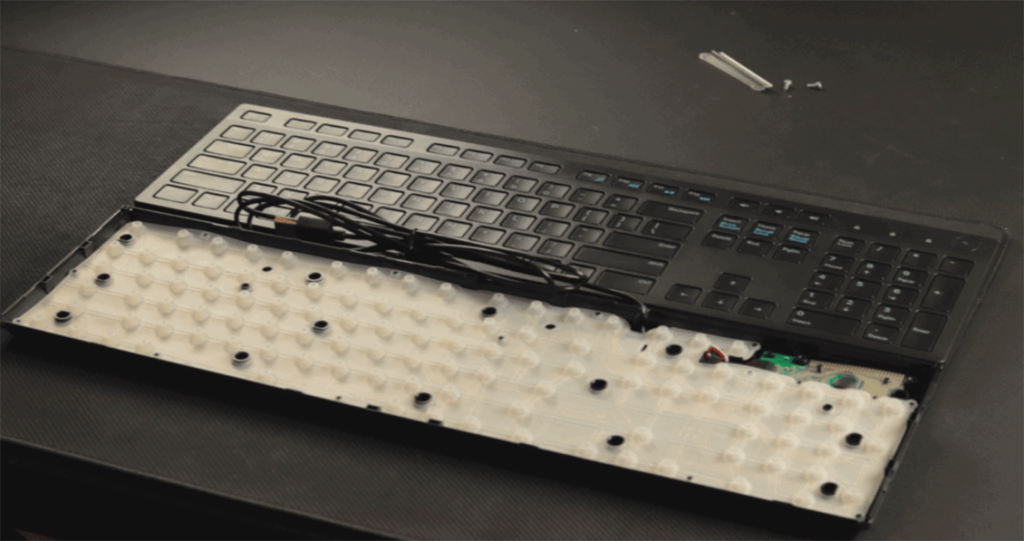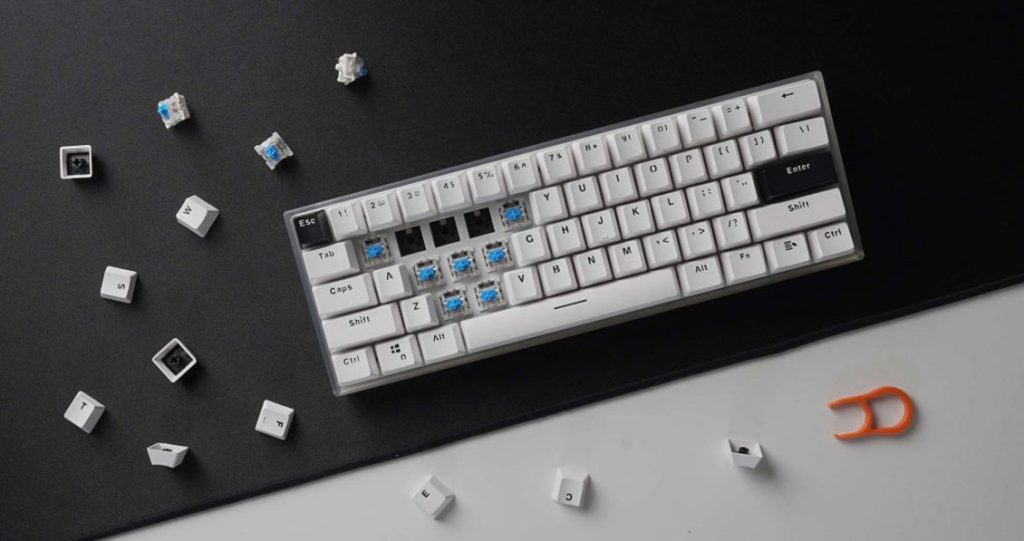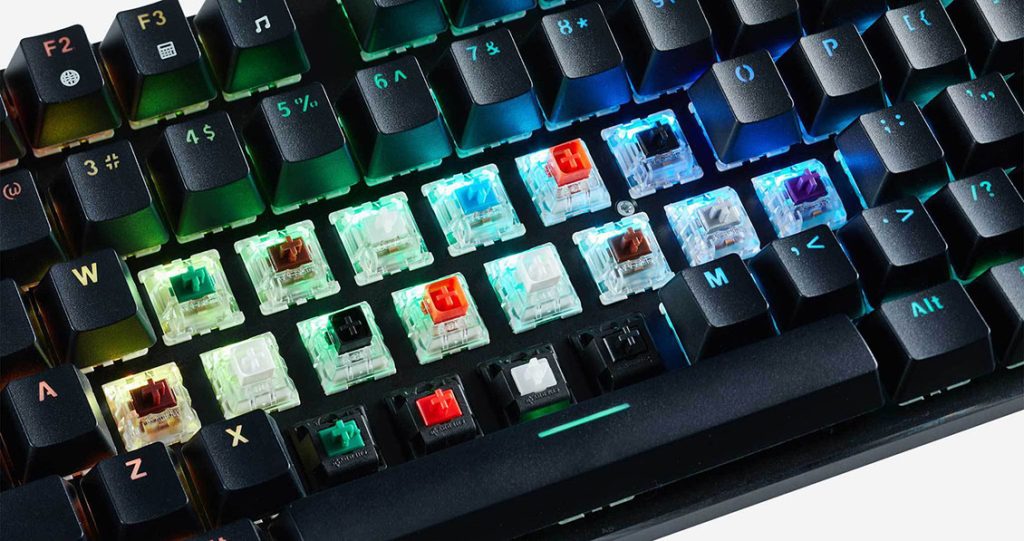In the vast landscape of computer peripherals, few devices play as crucial a role as the keyboard. It stands as the gateway to our digital world, facilitating communication, productivity, and entertainment. The debate surrounding the choice between Mechanical and Membrane keyboards has sparked endless discussions among tech enthusiasts and users alike. Each type comes with its unique set of features, advantages, and nuances, catering to diverse user preferences and needs.
Understanding Mechanical Keyboards
Mechanical Switches:
Mechanical keyboards feature individual switches beneath each keycap. These switches are the essence of the keyboard’s tactile feedback and actuation. They operate via metal contacts within the switch housing, which actuates when pressed. The switches come in various types, each characterized by factors like actuation force, tactile feedback, and noise level.
Switch Varieties:
Mechanical keyboards boast a range of switch options, including the popular Cherry MX switches known for their reliability and distinct tactile feedback. Additionally, Gateron switches offer smoothness and various actuation options, while Razer switches prioritize gaming responsiveness. Other switch manufacturers like Kailh and Omron also contribute to the diverse range available to users.
Tactile Feedback and Sound:
One of the defining features of mechanical keyboards is their tactile response. Each keypress provides a tangible sensation, known as tactility, providing users with a satisfying feel of key actuation. Furthermore, the audible click produced by certain switches, like Cherry MX Blue, adds an acoustic element to typing, contributing to the overall typing experience.
Durability and Longevity:
Mechanical keyboards are renowned for their durability. The switches are rated for a specific number of keystrokes, typically in the millions, ensuring longevity and consistent performance over an extended period. This durability makes mechanical keyboards a favored choice for users seeking a long-lasting typing solution.
Understanding Membrane Keyboards
Rubber or Silicone Membrane:
Membrane keyboards operate on a different principle. They utilize a single rubber or silicone membrane layer beneath the keys. When a key is pressed, it causes the top and bottom membrane layers to connect, registering the keystroke. This design eliminates the need for individual switches under each key.
Quiet Operation and Affordability:
Membrane keyboards are known for their quiet and soft keystrokes. They produce minimal sound compared to their mechanical counterparts, making them suitable for environments where noise is a concern. Additionally, membrane keyboards are often more affordable due to their simpler construction and materials used.
Lack of Tactile Feedback:
Unlike mechanical keyboards, membrane keyboards generally lack distinct tactile feedback. The absence of individual mechanical switches means there’s a more consistent, cushioned feel to typing, but without the pronounced tactile response experienced in mechanical keyboards.

Considerations on Longevity:
While membrane keyboards can offer reasonable longevity, their durability might not match that of mechanical keyboards. The rubber or silicone membranes may wear out over time with heavy use, potentially leading to decreased responsiveness.
Construction and Typing Feel of Mechanical Keyboards
Tactile Feedback and Switch Varieties:
Mechanical keyboards are celebrated for their tactile feedback, which is a result of the varied switch designs. These switches offer discernible tactile responses, providing users with a pronounced feel when a key is pressed. The design of mechanical switches allows for customization based on user preferences, offering options in actuation force, tactility, and noise level.
Actuation Force and Key Travel:
The actuation force, or the amount of pressure needed to register a keystroke, differs among various types of mechanical switches. Some switches require lighter actuation forces (such as Cherry MX Red), suitable for swift and effortless typing, while others demand more force (like Cherry MX Black), often preferred by gamers for precise inputs. Additionally, the key travel distance varies, influencing the depth to which a key needs to be pressed for actuation.
Clickiness and Audible Feedback:
Certain mechanical switches, notably Cherry MX Blue, produce an audible click when activated. This auditory feedback accompanies the tactile sensation, offering a satisfying typing experience. Users who enjoy the distinct click sound often find it enhances their typing rhythm and overall satisfaction while using the keyboard.
Typing Experience Customization:
Mechanical keyboards provide the opportunity for users to personalize their typing experience. With the ability to swap keycaps, combine different switches on the same keyboard, or even lubricate switches for smoother operation, users can fine-tune the keyboard to match their specific preferences, whether for typing, programming, or gaming.
Construction and Typing Feel of Membrane Keyboards
Soft and Cushioned Typing Experience:
Membrane keyboards, in contrast, offer a softer typing experience owing to the rubber or silicone membrane beneath the keys. Pressing a key compresses the membrane layers, producing a more cushioned feel without the pronounced tactile response of mechanical switches.
Lack of Tactile Feedback:
Unlike mechanical keyboards, membrane keyboards typically lack the distinct tactile feedback associated with individual mechanical switches. The keystrokes feel more uniform and cushioned across the entire keyboard, resulting in a smoother, but less tactile, typing experience.
Consistency and Quieter Operation:
Membrane keyboards are known for their consistent and quieter operation. The absence of individual switches means there are no audible clicks or distinct key presses, making them suitable for environments where noise reduction is a priority, such as offices or shared workspaces.
Limited Customization Options:
Compared to mechanical keyboards, membrane keyboards offer fewer customization options. They generally have fixed keycaps and a uniform typing experience throughout the keyboard, limiting the ability to modify key feel or switch types.
Durability and Longevity of Mechanical Keyboards
Robust Build Quality:
Mechanical keyboards are renowned for their sturdy construction and robust build quality. The individual mechanical switches, typically made with high-quality materials such as metal contacts and durable plastic housings, contribute significantly to their longevity.
Tens of Millions of Keystrokes:
One of the standout features of mechanical keyboards is their impressive durability in terms of keystroke lifespan. Mechanical switches are often rated for tens of millions of keystrokes per switch. This durability ensures consistent performance over an extended period, even with heavy and prolonged use.

Resilience to Wear and Tear:
The design of mechanical switches allows them to withstand wear and tear exceptionally well. Their robustness and resistance to degradation make them suitable for environments demanding prolonged usage, such as professional settings or intense gaming sessions.
Extended Lifespan:
Due to their durable construction and individual switch design, mechanical keyboards generally have an extended lifespan compared to other keyboard types. Users can expect consistent performance and responsiveness for a considerable duration, making them a worthwhile investment for long-term use.
Durability and Longevity of Membrane Keyboards
Reasonable Longevity:
Membrane keyboards, while generally less durable compared to mechanical ones, still offer reasonable longevity. The construction of rubber or silicone membranes beneath the keys contributes to their overall durability, allowing them to withstand regular typing and usage.
Potential for Degradation:
However, over time and with heavy use, the rubber membranes in membrane keyboards may start to degrade. Continuous compression and wear can lead to a reduction in responsiveness, resulting in keys feeling less tactile or occasionally failing to register keystrokes.
Considerations for Heavy Use:
For users who extensively utilize their keyboards for extended periods, such as professional typists or gamers engaging in prolonged gaming sessions, membrane keyboards might exhibit signs of wear sooner compared to their mechanical counterparts.
Maintenance and Care:
Proper maintenance and care can help extend the lifespan of membrane keyboards. Regular cleaning to remove dust or debris and avoiding excessive force when typing can contribute to preserving their responsiveness and longevity.
Gaming Performance of Mechanical Keyboards
Precise Actuation Points:
Mechanical keyboards are favored by gamers for their precise actuation points. The distinct tactile feedback and customizable actuation force of different switch types enable gamers to execute commands with accuracy and speed. This feature is particularly advantageous in genres such as First-Person Shooters (FPS), Multiplayer Online Battle Arenas (MOBA), and Real-Time Strategy (RTS) games that demand quick and precise inputs.
Tactile Feedback for Gaming Advantage:
The tactile feedback provided by mechanical keyboards allows gamers to feel the actuation point, aiding in timing and responsiveness during gaming sessions. This tactile response contributes to a more immersive gaming experience and helps in reducing input errors or missed keystrokes during intense gameplay.
Customization for Gaming Preferences:
Gamers can choose specific switch types that align with their gaming preferences. For instance, some prefer switches with light actuation forces for rapid keystrokes (e.g., Cherry MX Red), while others opt for switches with tactile feedback and audible clicks (e.g., Cherry MX Blue) for precise inputs in strategy-based games.
Durability for Prolonged Gaming Sessions:
The durability of mechanical keyboards makes them well-suited for prolonged gaming sessions. They can withstand the rapid and repeated keystrokes common in gaming without compromising performance or responsiveness.
Gaming Performance of Membrane Keyboards
Suitable for Casual Gaming:
While membrane keyboards might lack the tactile feedback associated with mechanical switches, they can still be suitable for gaming. Casual gamers or individuals seeking a quieter typing experience may find membrane keyboards sufficient for their gaming needs.
Smooth and Consistent Typing:
Membrane keyboards offer a smoother and more consistent typing experience across the entire keyboard. While lacking the tactile feedback of mechanical switches, the uniformity in keystrokes can still facilitate adequate gaming performance, especially for games that do not rely heavily on quick and precise inputs.
Affordability and Accessibility:
Membrane keyboards are often more affordable than their mechanical counterparts, making them accessible to a wider range of users. For casual gamers or those with budget constraints, membrane keyboards provide a cost-effective option for gaming.
Quieter Operation:
The quieter operation of membrane keyboards can be advantageous for gaming in environments where noise reduction is crucial, allowing for focused gameplay without the distracting clicky sounds associated with some mechanical switches.
Deciphering the Best Keyboard for You
The quest for the perfect keyboard often boils down to the choice between Mechanical and Membrane keyboards. Each type offers distinct characteristics, catering to different user preferences, typing habits, and usage scenarios. Let’s summarize the comparison and key considerations to aid in choosing the ideal keyboard for individual needs.
Mechanical Keyboards: Tactile Precision and Customization
Mechanical keyboards stand out for their tactile precision, audible feedback, and customizable nature. Their individual mechanical switches, available in various types and actuation forces, provide a unique typing experience tailored to individual preferences. With robust build quality and impressive durability, they excel in offering a satisfying typing experience and enhanced gaming performance, albeit at a higher price point.
Membrane Keyboards: Softness and Affordability
In contrast, membrane keyboards offer a softer, quieter typing experience due to the rubber membrane beneath the keys. While lacking the distinct tactile feedback of mechanical keyboards, they present a more budget-friendly option. Membrane keyboards cater to users seeking a comfortable and cost-effective solution for typing tasks, though they might not match the durability or customizable aspects of mechanical keyboards.
Choosing Your Ideal Keyboard
Selecting the ideal keyboard ultimately hinges on personal preferences, usage scenarios, and budget considerations. Mechanical keyboards suit individuals craving tactile precision, durability, and customization, ideal for both typists and gamers willing to invest in a premium typing experience. Conversely, membrane keyboards appeal to those prioritizing a softer touch, affordability, and a quieter typing environment, suited for casual users and budget-conscious consumers.
Considerations for Your Typing Experience
When making a decision, ponder your typing habits, gaming preferences, and the importance of tactile feedback and durability. Consider the keyboard’s primary purpose—whether for professional typing, gaming, or general use—and weigh it against your budget constraints to find the optimal balance between performance, comfort, and affordability.
In the end, the ‘best’ keyboard varies from person to person. Understanding the distinctions between Mechanical and Membrane keyboards empowers users to make an informed choice aligned with their specific needs and preferences, ensuring a more satisfying and enjoyable typing experience.

